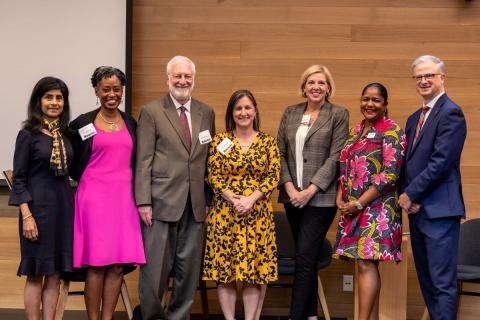FRIDAY, SEPTEMBER 29, 2023
By Chels Fabian

The College of Arts and Science has announced its newest research center, the Center for the Humanities, dedicated to advancing humanities research, collaboration across disciplines and public scholarship. To officially launch the new Center, the college hosted a panel that featured humanities center directors from across the country on Thursday, Sept. 28.
The panel, moderated by Sheri-Marie Harrison, Associate Dean of Graduate Studies and Faculty Success in the College of Arts and Science, featured Robert Newman, President and Director of the prestigious National Humanities Center; Giselle Anatol, Interim Director at Hall Center for the Humanities and Director of the Gunn Center for the Study of Science Fiction at the University of Kansas; and Stephanie Kirk, Director of the Center for the Humanities at Washington University.
Spanning the study of art, history, identity, literature and culture, humanities scholars and students at Mizzou make up a vibrant population. The Center will foster connections among the various humanities fields and scholars in order to deepen intellectual exchange, introduce more research opportunities and increase grant collaborations.
Julie Passanante Elman, the Center’s director, identified the need for an integrative structure to facilitate the kind of multidisciplinary research that bolsters collaboration among humanists, artists and scientists. Elman — along with her colleagues on the Center’s Executive Committee — knew that this kind of approach would be instrumental in nurturing world-changing humanities research coming out of Mizzou.
The Center’s activities fall under the categories of research, student experience and public outreach. Each of these areas represents why the Center exists: to bring together the research of scholars and students in the humanities and use that research to address global challenges and improve lives.
“We are launching the Center for Humanities because of the power of this work and its importance to all of us,” said Cooper Drury, Dean of the College of Arts and Science. “While some universities are divesting from their humanities research and teaching, we’re focusing our efforts in this area. The humanities helps us all to understand people better, so we can teach, collaborate with, and work alongside each other more effectively.”
The Center is already collaborating with state and community organizations to bring research in the arts and humanities to the broader community. In spring 2024, a special veteran’s initiative will be brought to the public, led by Phong Nguyen, a Professor of English and member of the Center’s executive committee. This initiative will focus on serving veterans – a frequently underserved population – and understanding their diverse and sometimes difficult experiences.
In collaboration with MOHumanities, Unbound Book Festival and the Kinder Institute on Constitutional Democracy, the Center will deliver a series of events, including writing workshops for veterans and their families, a panel of veteran writers at next year’s Unbound Book Festival, and a public lecture discussing the history of the military’s approach to PTSD and mental health.
For Elman, the most exciting part of having a humanities center at Mizzou is that it will bring attention to the crucial scholarly and public contributions of humanities research.
“The Center for the Humanities will provide a platform for the public to see how humanities research and teaching improves the lives of Missourians and others,” Elman says. “The Center will cultivate a space for humanities scholars to ask big questions and work toward building a better future together.”